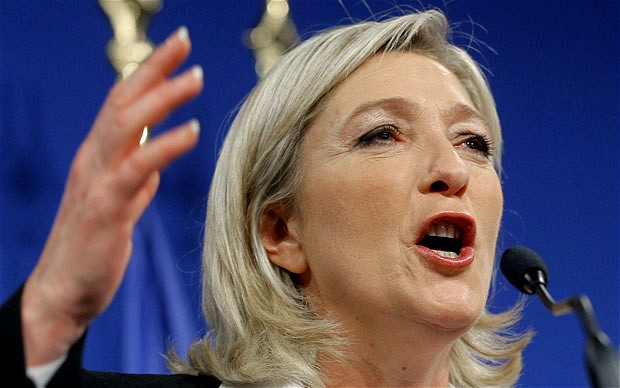 Europe’s far-right parties are set to contest next year’s European elections on a common manifesto, according to French National Front leader Marine Le Pen.
Europe’s far-right parties are set to contest next year’s European elections on a common manifesto, according to French National Front leader Marine Le Pen.
At a press conference in the Strasbourg Parliament on Wednesday (23 October), Le Pen, flanked by Franz Obermayr of the Austrian anti-immigration Freedom party, told reporters that she was hopeful of persuading nationalist candidates from across the EU to run on the ticket of the European Alliance for Freedom (EAF).
Le Pen said that people should vote for EAF parties “if they want to remain a free people”, adding that “we are the only parties who can return sovereignty”.
Referring to the recent tragedy on the shores of Lampedusa, where a boat carrying over 300 asylum seekers sank, killing over 50 people, Le Pen commented that “responsibility lies with people who encourage migrants to believe that they can claim asylum because they risk their lives to come to Europe.”
Senior figures in the parliament are growing increasingly anxious at the prospect of record numbers of eurosceptics being elected next May, potentially winning more seats than several moderate establishment parties.
Earlier this month, a survey by pollsters Ifop for French newspaper Le Nouvel Observateur, put Le Pen’s National Front party on 24 percent, higher than the centre-right UMP and the governing socialist party.
Geert Wilders’ Dutch Freedom party, also flying high in national opinion polls, is another ally, while the Belgian Vlaams Belang, Austria’s Freedom party and the Swedish Democrats are also part of the federation.
However, Le Pen took a side-swipe at UK eurosceptic party UKIP, widely expected to perform strongly in May, commenting that Nigel Farage’s party “lacked maturity” and were “afraid of their own image”.
The EAF was set up in 2010 and received over €750,000 from the European Parliament in 2011 and 2012. However, unlike other pan-EU parties it is composed of individual members rather than national parties.
Under the European Parliament’s internal rules, at least 25 MEPs from seven countries are needed to form a party group. The 31 ‘non-attached’ MEPs and the UKIP-dominated Europe of Freedom and Democracy (EFD) account for most of the eurosceptic deputies in the Parliament.
But difficulties maintaining discipline and a failure to agree on common programmes have dogged previous attempts to unite the far-right.
The Independence, Tradition and Sovereignty (ITS) group was set up in 2007 but only lasted ten months before collapsing when three MEPs representing the Greater Romania party walked out in protest at inflammatory remarks made by Alessandra Mussolini, granddaughter of the Italian dictator, about Romanian people.
